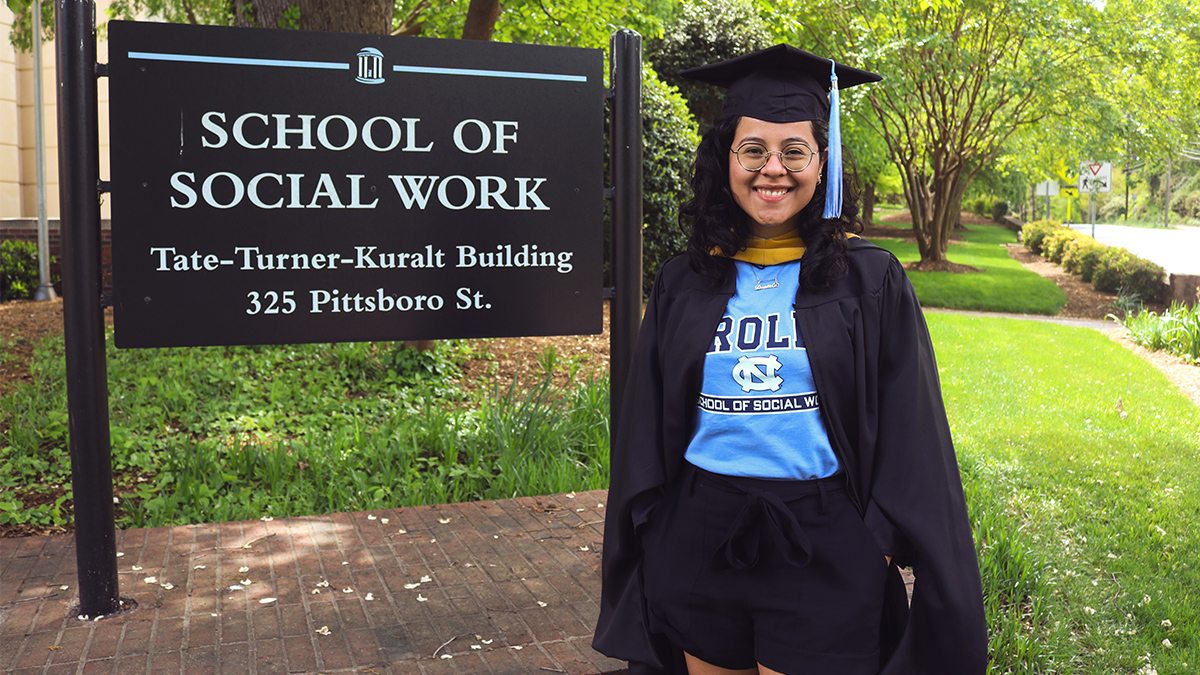Master of Social Work student Daniela Cerón dedicated to North Carolina’s rural communities
Graduating Tar Heel Daniela Cerón spent her time at UNC School of Social Work working in North Carolina communities to improve early childhood education outcomes.

A community-based job experience in Alamance County, North Carolina and working alongside a Carolina social worker alumna kindled Daniela Cerón’s interest in the field — this weekend, she will graduate from the School of Social Work with her master’s degree.
Following her undergraduate education at Elon University, Cerón completed a graduate fellowship experience at Alamance Achieves, dedicated to improving early childhood education outcomes. Cerón, from Rural Hall, North Carolina, felt without direction following her graduation until she began working alongside Yazmin Garcia-Rico (’18 MSW), an alumna of the Master of Social Work program while finishing the fellowship experience. She worked in the area of macro social work, which focuses on organizational management, policy development and community leadership.
“She was really influential,” Cerón said. “At the time, what I was doing was macro social work, but I didn’t have the terminology to realize that’s what I was doing.”
Cerón’s involvement in communities aligned with the mission of the Weiss Urban Livability Fellowship offered by The Graduate School. It supports graduate students with an interest in urban livability, and fellows design a community project, engage in forums, guest lectures, and mentorship opportunities. Cerón joined the MSW program as a Weiss fellow and became its senior fellow for the 2020-2021 school year.
“I really love interdisciplinary learning, and I love making connections where folks can’t see them,” Cerón said. “That’s something that Weiss provided me in graduate school: The opportunity to hear and listen to students who are pursuing their own interests that aren’t social work-related.”
Cerón’s passion for interdisciplinary community-based work led her to note many positive attributes about rural communities—specifically, their resiliency, strengths, and opportunities.
“Rural communities are often overlooked,” Cerón said. “Because of the social work program, I was able to better understand what those strengths are.”
Cerón said an internship with the Latino Migration Project while she pursued her master’s degree facilitated her understanding of how rural community organizations and local governments can best work together, particularly to support marginalized communities, including immigrants and refugees.
Through her internship, Cerón saw rural communities working to advance social justice, such as the development of language access services to bridge communication barriers and the creation of an equity task force.
“Rural communities are invested in the community around them,” Cerón said. “I saw there was this other aspect of social justice and improving positive outcomes for Black and Brown communities.”
Following graduation, Cerón hopes to pursue a role that allows for community research and engagement. As a first-generation undergraduate and graduate student, Cerón is glad she decided to pursue the field— a field she initially discovered while working in rural North Carolina.
“Social work is the golden ticket to anything,” Cerón said. “I’m very much a big-picture thinker. […] “Weiss was a huge part in helping me realize that social work applies to all of these areas that we talk about.”




